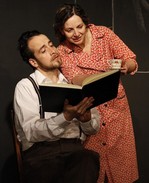SITE GUIDE
SEARCH
REVIEWS
REVIEW ARCHIVES
ADVERTISING AT CURTAINUP
FEATURES
NEWS
Etcetera and
Short Term Listings
LISTINGS
Broadway
Off-Broadway
NYC Restaurants
BOOKS and CDs
OTHER PLACES
Berkshires
London
California
New Jersey
DC
Philadelphia
Elsewhere
QUOTES
TKTS
PLAYWRIGHTS' ALBUMS
LETTERS TO EDITOR
FILM
LINKS
MISCELLANEOUS
Free Updates
Masthead
A CurtainUp Review
Working on a Special Day
By Joyce Friedland
| "I also feel. . .ashamed sometimes. . .humiliated, irrelevant…my
husband never speaks to me, he gives me orders. Day and night.
We haven't laughed since we got married. He laughs with other
women though."— Antonietta
|

Ana Graham and Antonio Vega
(Photo: Carol Rosegg) |
If that is not enough of a challenge for the imagination of the players and the audience alike, the scenery is created by the actors on previously blank chalkboard walls as the play progresses. The play itself, however, is the straightforward story of an overworked, uneducated housewife, mother of six children, unappreciated by her chauvinistic husband, who gains her self respect and sense of self worth when she meets and spends the day with a man who is her neighbor in the apartment building where they live. A radio broadcast describing Hitler's visit is heard in the background throughout the play.
This production is the result of a collaboration between the Por Piedad Teatro Foundation, a theater group based in Mexico City, and the Play Company, an American theater group dedicated to the presentation of adventurous new plays from around the world. The play itself was inspired by the 1977 film Una Giornata Particolare, starring Sophia Loren and Marcello Mastroianni.
Ana Graham and Antonio Vega, who have also directed the work, play the leading roles and the offstage supporting roles. In a questionable attempt to establish an intimacy with the audience, they begin by wearing contemporary street clothes and by addressing the audience directly, while the house lights remain on. As they chat, they remove their clothing (albeit in a discreet manner): Ms. Graham dons a house dress and apron for her role as Antonietta, while Mr. Vega for his role as Gabriele steps into an ill-fitting suit.
Ana Graham is convincing in her role as a victim in a world of her own making; she accepts her husband's bullying, allows her children to take advantage of her, and is proud of Italy's Fascist government. She conveys a broad range of emotion as her personal perceptions broaden and she suffers from inner turmoil while in the company of her neighbor. Antonio Vega is not quite as convincing as a man who is a misfit in Fascist society, who is first encountered with a pistol aimed at his own temple, and then attempts to bring light and spontaneity to Antonietta's life.
It is not clear whether the staging is prompted by a desire to be experimental or by budgetary considerations. In any case, the two actors not only play the voices of Antonietta's children, the building's porter, and Antonietta's husband, they conveyed the sound effects of a telephone ringing, a doorbell sounding, and a bird trilling.
As interesting as these noises are at times, they can be distracting during dramatic moments. The same is true of the evolution of the scenery on the three chalkboard walls surrounding the stage. When a window is needed to view the outside world and to observe the Hitler-day festivities, Antonietta draws it with chalk on the wall. The same method applies for a bird in a cage, a portrait of Mussolini, a lighting fixture that needed repair, and so on. When Gabriele has to draw a telephone on the wall before he could respond to the ringing sounds being transmitted by Ms. Graham, I felt that the stage business was taking over the play.
On a final, more positive note, I was fascinated by the radio broadcasts heard in the background that commented on Hitler's visit to Rome. They gave the play greater texture and added layers of meaning onto the story line. The sounds of adoring crowds, laudatory commentary, and military bands served as an ironic counterpoint to the domestic issues that were playing out in the lives of Antonietta and Gabriele. .
|
Working on a Special Day by Ettore Scola, and Ruggero Maccari,adapted by Gigliola Fantoni Translators: Danya Taymor, Ana Graham, Antonio Vega Directed by Ana Graham and Antonio Vega Cast; Antonio Vega (Gabriele, Emanuele), Ana Graham (Antonietta) Set & Lighting Design ; Gabriel Pascal, David L. Arsenault Costume Design; Ana Graham Sound Design; Rodrigo Espinosa Running Time; 1 hour, 10 minutes; no intermission 59E59 Theaters; 59 E. 59th St. From 1/10/13; opening 1/16/13; closing 2/17/13 Reviewed by Joyce Friedland 2/10/13 |
|
REVIEW FEEDBACK Highlight one of the responses below and click "copy" or"CTRL+C"
Paste the highlighted text into the subject line (CTRL+ V): Feel free to add detailed comments in the body of the email. . .also the names and emails of any friends to whom you'd like us to forward a copy of this review. Visit Curtainup's Blog Annex For a feed to reviews and features as they are posted add http://curtainupnewlinks.blogspot.com to your reader Curtainup at Facebook . . . Curtainup at Twitter Subscribe to our FREE email updates: E-mail: esommer@curtainup.comesommer@curtainup.com put SUBSCRIBE CURTAINUP EMAIL UPDATE in the subject line and your full name and email address in the body of the message. If you can spare a minute, tell us how you came to CurtainUp and from what part of the country. |

Slings & Arrows- view 1st episode free
 Anything Goes Cast Recording
Anything Goes Cast RecordingOur review of the show
 Book of Mormon -CD
Book of Mormon -CDOur review of the show

